On the afternoon of September 14th the BBC News website published a report by the BBC Jerusalem bureau’s Yolande Knell and the BBC Gaza office’s Rushdi Abualouf concerning a story from the previous day.
Titled ‘Explosion near Gaza boundary wall kills five Palestinians’, that report purports to inform BBC audiences about an incident that took place on September 13th in which several Gazans participating in violent rioting along the border between the Gaza Strip and Israel were killed when an IED targeting Israeli troops prematurely detonated.
The BBC’s report portrays that violent rioting as a ‘rally’: [emphasis added]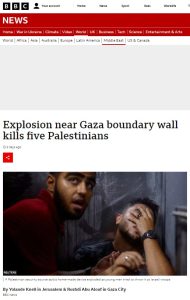
“The funerals have taken place of five Palestinians killed in an explosion in Gaza by the boundary wall with Israel.
Hundreds had joined two rallies at the time of the blast on Wednesday evening.
The Israeli military said there had been “an attempt by rioters to launch an explosive device” at its soldiers.
A Palestinian security source told the BBC that a home-made device “typically used to cause a disturbance by making a very loud, annoying sound” had exploded as young men were trying to throw it.”
Knell and Abualouf do not clarify whether or not the “Palestinian security source” from which they got information they considered worthy of publication is a Hamas official and neither do they bother to explain how a “home-made device” – a phrase intended to downplay its danger – which only makes “a very loud, annoying sound” managed to kill at least five people.
In paragraph six the absurdity of the use of the term “rallies” becomes even more apparent:
“The Israel Defense Forces (IDF) said protesters had previously thrown explosives and grenades at soldiers.
A grainy black and white video released by the IDF shows the explosion close to a concrete wall, which Israel has built around Gaza, as a small crowd of people runs away.”
That video can be seen here. Additional videos of the incident – possibly including that subsequently referenced by Knell and Abualouf – can be found here and here.
“A graphic Palestinian video seen by the BBC shows a large group of young men about 2m (6.6ft) from the Israeli barrier when there is a powerful explosion which appears to kill some protesters instantly. No Israeli forces are visible.”
Footage which emerged later showed the same rioters also shooting at Israeli forces with firearms.
Knell and Abualouf go on to unquestioningly present an account from a witness which clearly hinders – rather than helps – readers’ understanding of the story:
“A witness, Saif Muhareb said he was with a group of some 50 people.
“We found a black object that looked like a camera – 10cm wide and 50cm long. I was towards the back when someone touched it and it exploded.””
Knell and Abualouf give a whitewashed portrayal of the ‘Great Return March’ riots of 2018/19 which – as was the case in BBC coverage at the time – fails to clarify that “the Palestinian health ministry” is run by the same Hamas terrorist organisation that was involved in the organisation of the weekly riots or that around 80% of those killed during the violent rioting at the border have been shown to be affiliated with various terror organisations – primarily Hamas.
“Mass protests took place between 2018 and 2019, known as the Great March of Return.
Israeli snipers opened fire at protesters during the weekly demonstrations, killing more than 300 Palestinians and injuring thousands of others, according to the Palestinian health ministry. The Israeli military said it shot at people trying to infiltrate its territory.”
The background provided in relation to the current round of rioting states:
“Tensions in the area have recently increased after months of relative calm. […]
One of Wednesday’s demonstrations was called by Palestinian political factions – including the militant group Hamas, which governs Gaza – to mark the anniversary of Israel’s unilateral withdrawal from the strip in 2005. Another was called to show support for Palestinian prisoners in Israeli jails.”
Readers are not informed that similarly violent rioting along the border has already been taking place for several weeks. Neither do Knell and Abualouf bother to explain the connection between Hamas’ renewed efforts to spark “tensions” on the border, the demonstrations against Hamas which took place in the Gaza Strip in the previous weeks and the delays and cuts to cash donations from Qatar.
Knell and Abualouf chose to close their report with uncritical amplification of the notion of ‘martyrdom’: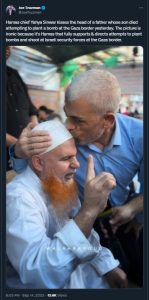
“Wael al-Zard, a local Hamas leader and preacher at the Grand Mosque, lost his son, 18-year-old Baraa.
“My heart is sad and my eyes shed tears over the loss of my son, the joy of my heart,” he said.
“But we say, thanks to God, I’m pleased to be the father of a martyr who sacrificed himself for the sake of his homeland. He made me hold my head high.””
In addition to Bara’a al-Zard, one of those killed in the incident was Mohammed Kadum, a member of the ‘Popular Resistance Committees’ (PRC) who had previously been involved in launching explosive devices carried by balloons into Israeli territory.
Clearly Knell and Abualouf could have done much more to inform BBC audiences fully, accurately and impartially both in relation to the incident itself and with regard to its context. Their omissions are particularly relevant given that the Hamas organised rioting along the border with Israel and the attempts to attack Israeli soldiers continue.
Related Articles:
BBC NEWS SILENT ON PALESTINIAN INCITEMENT AND GAZA RIOTING
BBC TRIES TO ERASE HAMAS’ ROLE IN ‘GREAT RETURN MARCH’ VIOLENCE
WHAT CAN BBC AUDIENCES EXPECT IF THE ‘GREAT RETURN MARCH’ RETURNS?

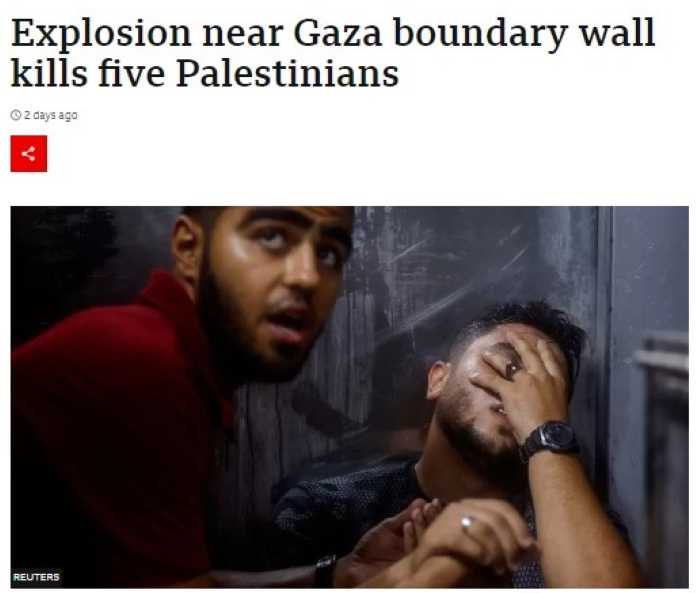
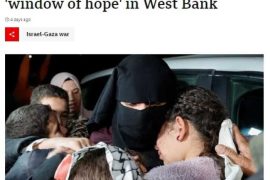
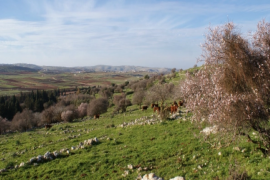

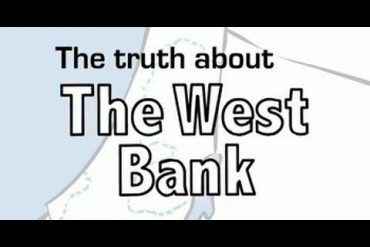
By now anyone believing a single word uttered by the BBC news teams in Israel needs their bumps feeling #defundthebbc